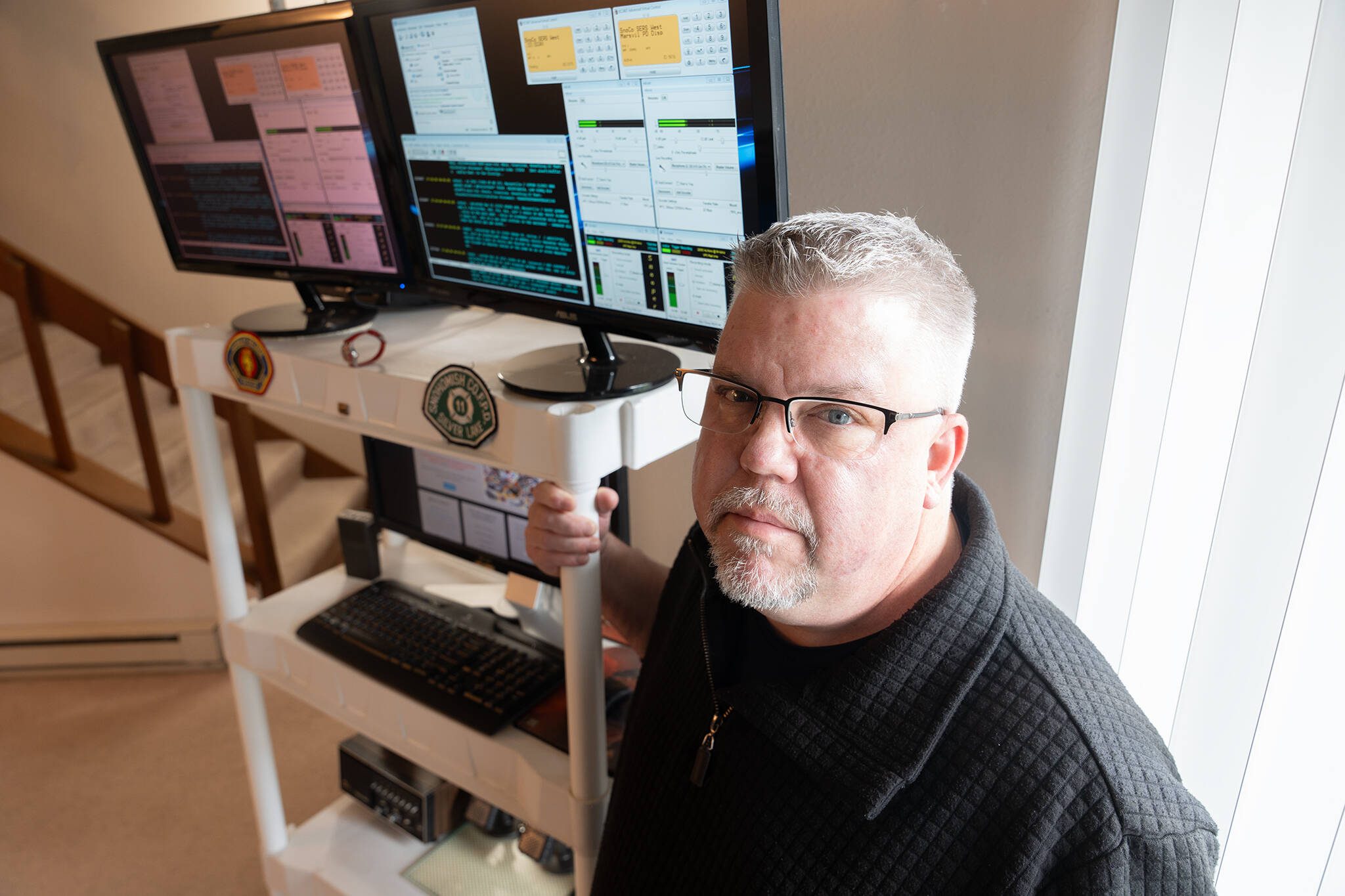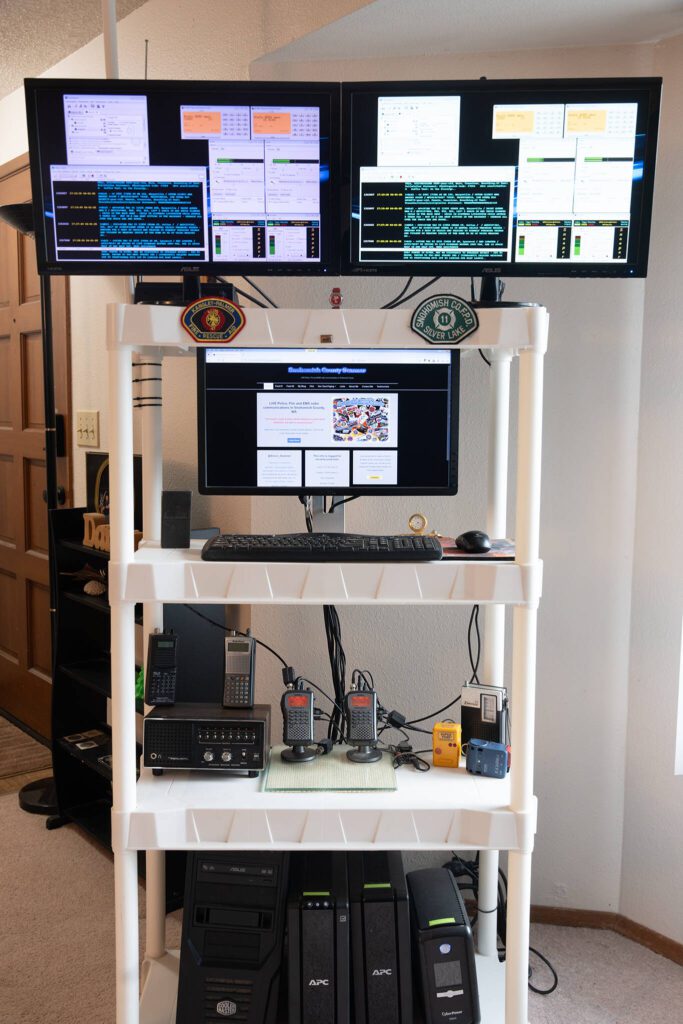EVERETT — As a young child, Daron Johnson listened to his dad’s police scanners. In his teens, he bought his own.
For the last 15 years, the Everett man ran one of the popular Snohomish County Scanner feeds followed by more than 28,600 people on Facebook and X.
He became known for breaking news of local incidents before the press, operating anonymously and partnering with journalists behind the scenes. Johnson thrived on the adrenaline and public service of letting citizens hear what was happening in their communities.
But now, he’s signing off.
“I want to get out ahead of this,” Johnson said. “Thank you to everybody who listened to it. But I’m moving on.”
Johnson is retiring in part because sometime this April, all law enforcement communications in Snohomish County will be encrypted. The change comes as emergency responders switch to a new P25 radio system, part of a 5-year, $71 million upgrade funded by a voter-approved sales tax in 2018.
Representatives for multiple law enforcement agencies did not confirm an exact date when this would take place.
In this context, encrypting means converting police radio communications into a secure digital format that cannot be accessed by the public using traditional scanners.
The voter-approved Emergency Communications Sales Tax was intended to replace a deteriorating radio system that had become unreliable.
In a YouTube video posted two weeks ago, Marysville Mayor Jon Nehring thanked voters for approving the funding.
“The current system has reached its end of life … We’re really grateful that the voters approved funding back in 2018 for a new system,” Marysville Mayor Jon Nehring said in a YouTube video posted by Snohomish County 911.
In the 2018 voter pamphlet, ballot language for the radio communications upgrade never mentioned “encryption.”
The upgrade brings improved reliability, but it also marks the end of real-time public access to police radio traffic — and with it, the end of Johnson’s Snohomish County Scanner feed.
“Once things are encrypted, no one will be able to use a scanner anymore,” said Kurt Mills, director of Snohomish County 911, which oversees the system.
According to Mills, law enforcement talk groups will be encrypted while fire and EMS channels will remain open — for now. The request to encrypt communications came from local law enforcement, Mills said without supplying specifics.
“Their safety could be at jeopardy if somebody with bad intent was monitoring them while they’re responding,” he said. “The main reason that they chose to encrypt was for officer safety.”
“Law enforcement faces safety risks from individuals using scanners and online feeds to monitor their movements in real time,” said Courtney O’Keefe, spokesperson for the Snohomish County Sheriff’s Office, in an email. “Suspects can and have used scanner apps to track law enforcement activity while an active investigation/incident is occurring.”
Everett Police Chief John DeRousse echoed the concern.
“Police officers rely on radios as a critical communication tool with one another in the field,” DeRousse said in an email. “Often this means transmitting information that may contain sensitive operational details. Encryption ensures this information cannot be used to aid criminal activity or avoid law enforcement apprehension.”
Assistant Chief Colt Davis of the Mukilteo Police Department said encryption is essential for protecting both officers and the public.
During his time on patrol, he often encountered criminals using scanners to monitor police movements. He explained that when calls pull officers to a specific location, it can leave other areas of the city more vulnerable to crime.
“We’re not trying to keep things from the public, we’re just trying to be safe,” Davis said.
Also, sensitive information like names, birthdates and addresses sometimes transmits over open radio waves. Encryption, Mills said, protects that data.
This change follows King County’s move to encrypted police radios in March of 2023.
The current system is over 20 years old and prone to congestion during high call volume. Parts were sourced from eBay, and cybersecurity updates were no longer available.
“We’re on a very old system, at the end of life,” Mills said. “We were keeping it running with bubble gum and shoe string.”
The upgrade includes 5,000 digital radios with military-grade encryption, 22 upgraded radio sites, and infrastructure improvements like geo-redundant controllers and microwave networks. The new system will also double capacity.
The project covers 44 fire, law enforcement and EMS agencies serving more than 844,000 people across Snohomish County.
When asked how media will access breaking information under the new system, Mills said there have been discussions about potential resources, but nothing is guaranteed. Reporters will still be able to request incident records after the fact.
For Johnson, he saw all of this coming for nearly a decade.
Sometimes, his access put him at odds with law enforcement, like when Monroe police once requested IP addresses after a suspect reportedly used Johnson’s feed during a bank robbery.
But the magic has faded. Now Johnson has stepped back from posting and is ready to disassemble the home setup that kept the scanner feed alive. With police communications making up most of his site’s traffic, he said there’s not much point in keeping it running.
“I understand both sides of it,” Johnson said. “It only takes one bad act.”
Mark Horner, a retired breaking news reporter who worked for media outlets across the country and state, sometimes relied on Johnson’s reports for tips on emerging stories. Now he wonders how encryption could affect police transparency.
“When things are fully transparent as they are with the scanner, it’s, arguably, a clear look into what’s happening in a live timeline,” Horner said. “You’re going to be losing that now … anything short of full transparency can become subjective”
Aspen Anderson: 425-339-3192; aspen.anderson@heraldnet.com; X: @aspenwanderson.
Talk to us
> Give us your news tips.
> Send us a letter to the editor.
> More Herald contact information.



























